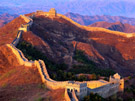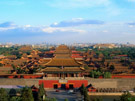| Written Speech by H.E. Hu Jintao President of the People's Republic of China At the High-level Plenary Meeting of the United Nations' 60th Session |
| 2005-09-22 00:00 |
|
Build Towards a Harmonious World of Written Speech by H.E. Hu Jintao New York, September 15, 2005 Mr. President, At this solemn and important moment, national leaders and representatives from around the world are gathered here to commemorate the 60th anniversary of the founding of the United Nations, renewing our commitment to the purposes and principles of the UN Charter and expressing our determination to safeguard world peace and promote common development. For this is not only the shared wish of the people of all lands but also the common understanding of visionary statesmen of all countries. The United Nations was founded as a result of mankind's persistent efforts to seek peace and development. It embodies the lofty spirit of the world's people to "save succeeding generations from the scourge of war, which twice in our lifetime has brought about untold sorrow to mankind" and to "live together in peace with one another as good neighbors". It also carries the beautiful ideal of the international community to jointly promote economic and social development. The founding of the United Nations, as its 60 years of history has shown, is an epoch-making event, and an important milestone in mankind's cause of peace and progress. In the past 60 years, amid stupendous changes around the world and vicissitudes in the international arena, the United Nations has gone through all kinds of tests and traversed an extraordinary course. We are glad to see that in the past six decades, particularly since the end of the Cold War, the United Nations has played an important role and made enormous achievements in maintaining world peace, promoting common development and advancing human progress thanks to the concerted efforts of its members to facilitate its various endeavors. In the past 60 years, though regional turmoil continued and local conflicts took place from time to time, countries have accorded greater emphasis to dialogue, cooperation and settlement of disputes by negotiations. Working through the United Nations to prevent and end armed conflicts and maintain world peace has increasingly become a universal pursuit in the international community. Observing the international responsibility, undertaking the international obligation, settling disputes by peaceful means, adopting effective collective measures to jointly safeguard regional and global security ? these original purposes of creating the United Nations have also become the sure path towards lasting peace and universal security in the world. In the past 60 years, though power politics still lingered and democratized international relations remained elusive, dialogue, exchanges and harmonious co-existence have become the mainstream of state-to-state relations. Mutual respect and treating each other as equals have become an important consensus of the international community. Respect for sovereignty and territorial integrity, as well as respect for countries' right to independently choose their own social systems and paths of development, are not only important principles enshrined in the UN Charter, but have increasingly become guiding principles for countries with differing social systems and development levels to establish and develop their relations. In the past 60 years, though the benefit of development spread rather unevenly in the world as poverty and hunger ravaged not so few countries, the international community has already set out the goal of reducing poverty and promoting development. Closer cooperation for common development has become the choice of more and more countries. The promotion of international cooperation for common development and win-win results is not only an important purpose of the United Nations, but has increasingly become an important way for countries to achieve common development and common prosperity. Mr. President, Distinguished Colleagues, The 21st century has opened up a bright prospect for the development of mankind. As we move ahead with safeguarding world peace and promoting common development, we are faced with both rare opportunities and severe challenges. Peace, cooperation and development represent the main theme of our times. The trend towards a multi-polar world with a globalized economy is deepening. Thanks to the rapid advancement of science and technology, productivity around the world has increased remarkably, and the global economy has maintained an overall growth. Regional and global cooperation of one kind or another has become more dynamic, and efforts to build greater democracy in international relations picked up steam. Mankind as a whole is making progress at a pace never seen before. At the same time, peace and development, the two overriding questions before the world, have not yet been fundamentally resolved. Local wars and conflicts caused by varying reasons keep cropping up. The hotspot issues in some regions remain complicated and thorny. The wealth gap between the North and South continues to widen. People in many countries are still being denied of the right to subsistence and even survival. International terrorists, ethnic separatists and religious extremists in some parts of the world remain rampant. Many cross-boundary problems such as environmental pollution, drug trafficking, transnational crimes and deadly communicable diseases have become more salient. All this has made our road towards universal peace and common development a bumpy and challenging one. Mr. President, Distinguished Colleagues, History has been a wonderful guide. At the important historic period when both opportunities and challenges are presented, countries can only create a bright future for mankind and truly put in place a harmonious world with lasting peace and common prosperity when they rally closely together to seize the opportunities and take on the challenges. Let me share with you some of my views in this connection. First, uphold multilateralism to realize common security. Peace is the fundamental premise for mankind's development. Without peace, we can neither go for new development agenda nor prevent the destruction of the achievements of our previous development. War and conflict are disastrous to any country, be it big or small, strong or weak. All countries therefore should join hands in coping with global security threats. We must abandon the Cold War mentality, cultivate a new security concept featuring mutual trust, mutual benefit, equality and cooperation, and build a fair and effective collective security mechanism aimed at jointly preventing war and conflict and safeguarding world peace and security. The United Nations, as the core of the collective security mechanism, plays an irreplaceable role in international cooperation to ensure global security. Such a role can only be strengthened and must not in any way be weakened. The purposes and principles of the UN Charter are crucial to safeguarding world peace and security. They have been widely recognized as the basic norms governing international relations and must be complied with in real earnest. As the special agency of the UN responsible for maintaining world peace and security, the Security Council must be given the authority to carry out its mandate. We should encourage and support efforts to peacefully settle international disputes or conflicts through consultations and negotiations. We should all oppose acts of encroachment on other countries' sovereignty, forceful interference in a country's internal affairs, and willful use or threat of military force. We should step up anti-terrorist cooperation in a resolute fight against terrorism, working to address both the symptoms and root causes of the problem with special emphasis on eliminating the sources of the menace. We should realize effective disarmament and arms control in a fair, rational, comprehensive and balanced fashion, prevent the proliferation of nuclear weapons, vigorously promote the international nuclear disarmament process and maintain global strategic stability. Second, uphold mutually beneficial cooperation to achieve common prosperity. Development has a bearing on the vital interests of the people of all countries, and also on the removal of global security threats from their sources. Without universal development and common prosperity, our world can hardly enjoy tranquility. The deepening of economic globalization has made countries' interests mutually intertwined, and their respective development depends more closely on global development. But such globalization should benefit all countries, developing countries in particular, instead of leading to a more polarized world where the poor become poorer and the rich richer. The United Nations should take concrete measures to implement the Millennium Development Goals, particularly in the area of accelerating the development of developing countries, so that the 21st century can truly become a "century of development for all". We should work actively to establish and improve a multilateral trading system that is open, fair and non-discriminatory, and further improve the international financial regime with a view to putting in place a healthy and orderly trading environment and a stable and efficient financial environment conducive to global economic growth. We should step up worldwide energy dialogue and cooperation, jointly maintain energy security and energy market stability, and ensure a well-supplied, secure, cost-effective and clean energy environment conducive to global economic growth. We should actively promote and protect human rights, make universal education available, achieve gender equality, upgrade public health capacity building and ensure the enjoyment of equal right and opportunity to all-round development by all. The developed countries should shoulder greater responsibility for a universal, coordinated and balanced development in the world with further opening of their markets, more technology transfer, increased aid and greater debt forgiveness to the developing countries, those heavily indebted poor countries and least developed ones in particular. The developing countries should make a fuller use of their own advantages to develop themselves, expand South-South cooperation and promote across-the-board progress in their own society. China will do its best and actively contribute to the common development of all countries. Third, uphold the spirit of inclusiveness to build a harmonious world together. Diversity of civilizations is a basic feature of humanity and an important driving force behind human progress. In the course of human history, all civilizations have, in their own way, made a positive contribution to the overall human progress. It is their differences that allow them to learn from one another and grow stronger together. Uniformity, if imposed on them, can only take away their vitality and cause them to become rigid and decline. The world's civilizations may differ in age, but none is better or more superior than others. Differences in history, culture, social system and mode of development should not become barriers to exchanges between countries, let alone excuses for confrontation. We should respect every country's right to independently choose its own social system and path of development, and encourage countries to go for mutual emulation instead of deliberate exclusion, for mutual learning of respective strong points instead of making fetish a particular model, thus succeeding in their rejuvenation and development in line with their national conditions. We should enhance intercivilization dialogue and exchanges, allowing cultures to complement one another through competition and comparison, and to develop together by seeking common ground while putting aside differences. We should do away with misgivings and estrangement existing between civilizations and make humanity more harmonious and our world more colorful. We should endeavor to preserve the diversity of civilizations in the spirit of equality and openness, make international relations more democratic and jointly build towards a harmonious world where all civilizations coexist and accommodate each other. Fourth, promote UN reform actively and prudently. The purposes and principles of the UN Charter are consistent with the historic tide of peace, development and cooperation. They also meet the requirements of sound international relations and serve the fundamental interests of the people around the world. We should carry out rational and necessary reform to maintain the authority of the United Nations, improve its efficacy and give a better scope to its role so that it will be better empowered to take on new threats and new challenges. Since the UN reform is all-dimensional and multi-faceted, it may be conducted in a step-by-step manner with focus on the easier tasks before more difficult ones for maximized benefits. Greater UN commitment to the question of development should be a priority of the reform. Efforts should be intensified to uphold the purposes and principles of the UN Charter and strengthen the solidarity of the UN membership. The reform of the Security Council is an important component of the UN reform. The reform should aim, as a priority, to increase the representation of the developing countries, African countries in particular, and allow more countries, especially small and medium-sized countries, to participate in the decision-making of the Security Council. With the interests of many countries at stake, the reform should allow full consultations before any decision is made on the basis of the broadest consensus. Mr. President, Distinguished Colleagues, I would like to reiterate here what China stands for. We will continue to hold high the banner of peace, development and cooperation, unswervingly follow the road of peaceful development, firmly pursue the independent foreign policy of peace and dedicate ourselves to developing friendly relations and cooperation with all countries on the basis of the Five Principles of Peaceful Coexistence. Always integrating our development with the common progress of mankind, we take full advantage of the opportunities brought by world peace and development to pursue our own development while going for better promotion of world peace and common development through our successful development. China will, as always, abide by the purposes and principles of the UN Charter, actively participate in international affairs and fulfill its international obligations, and work with other countries in building towards a new international political and economic order that is fair and rational. The Chinese nation loves peace. China's development, instead of hurting or threatening anyone, can only serve peace, stability and common prosperity in the world. Mr. President, Distinguished Colleagues, Throughout the long history, human communities have never been so closely interconnected in interests and destinies. Our common goals have put us all in the same boat, and the common challenges we face require that we get united. Let us join hands and work together to build a harmonious world with lasting peace and common prosperity. Thank you.
|
|











